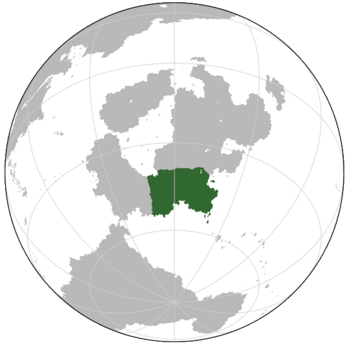Onhsanenea
Republican Sultante of Onhsanenea 2 official names
| |||||
|---|---|---|---|---|---|
Coat of Arms
| |||||
| Anthem: Battle Hymn of the Sultanate | |||||
 | |||||
| Capital and largest city | Wahhata | ||||
| Official languages | Classical Arabic Onhsanenean | ||||
| Recognised regional languages | Yawathan Dilanian | ||||
| Ethnic groups (2022) |
| ||||
| Religion (2018) |
| ||||
| Demonym(s) | Onhsanenean | ||||
| Government | Unitary constitutional Islamic sultante | ||||
| Legislature | Royal Council | ||||
| Liberation | |||||
• First Independence | 1 July 1920 | ||||
| 19 January 1945 | |||||
| 27 April 1982 | |||||
| Population | |||||
• 2023 estimate | 24,500,000 | ||||
• 2018 census | 23,890,019 | ||||
| GDP (nominal) | 2023 estimate | ||||
• Total | |||||
• Per capita | |||||
| Gini (2023) | medium | ||||
| HDI (2022) | very high | ||||
| Currency | Onhsanenean Volnakos (₪) (OVN) | ||||
| Date format | dd-mm-yyyy | ||||
| Driving side | right | ||||
| Calling code | +07 | ||||
| ISO 3166 code | OH | ||||
| Internet TLD | .oh | ||||
Alaoyi, officially the Federative Republic of Alaoyi (FRA), is the southernmost country in Galia. It is surrounded to the south and east by a vast coastline that stretches along the Achrinian Ocean, to the north by the neighbouring country of Naossia; to the west by Inglaterra; and to the very northwest the Great Galian Sea. The country is mostly cold with terrain ranging from subpolar forests on the west coast to steppes in the east. With over 109 million people, Alaoyi is one of the largest countries on Manala. The capital is located in the city of Seekant, which lies along the eastern coastline. The largest city is Biyonummiri in the northwestern coast. Other major cities include Meirleach, Dimboru, Katwijk, Cathaisce, and Rivierkant.
About 80% of the population are "pales", most of whom belong to the Onslander and Diash groups. A signifigant Marchan population exists in the northwest with Inith populations existing to the west of the country. Other Cetanni groups inhabit the northeast of the country. The remaining population mostly consists of a large Ndibeanyan community, primarily centered along the northwest and central regions of the country. According to the 2020 census, the two most spoken first languages are Onslander (39%) and Ndibeanyan (21.8%). About 25% of Alaoyians speak Diash at home. Much of the population is, in addition to their native languages, somewhat fluent in Onslander, which commonly serves as a commerical and public language across the other language groups, a change from when Ndibeanyan was more common. Fluvan is also not uncommon.
The country first began as a set of colonial possessions belonging to Alanna at the midway point of the 18th century. After several wars of conquest Onsland and the various Diash tribes fell under Alannan control by 1875. In 1921, the various possessions were unified under the control of viceroys, who served as governors of the various colonies. One viceroy would represent the various colonies in the imperial court. During the First Great War, the Alaoyian colonies fought alongside Alanna, mostly against the expanionist and newly independent Inglaterrans. However, tensions between the two led to war during the Third Great War on the Galian front. Just before the Second Great War, the Alaoyian colonies declared independence due to the revolution in Alanna. While some Alanna port cities were occupied, the majority of Alaoyian combat was against Inglaterra and alongside Antarctic and Niagaran troops. After the Second Great War ended, Alaoyi and Inglaterra fought a cold war and competed for regional power. After the Third Great War, Alaoyi became a much stronger regional power, but tensions began in the 2010s with Inglaterra once more.
Alaoyi, from 1951 to 1987, was governed under a complex set of rules and laws regarding race relations, known as ewezuga. Under ewezuga the colonial (and minority) Alannans, chiefly Ndibeanyans, governed the country and had a high standard of living comparable to a first world nation. However, the segregated pale groups were often mistreated and suffered from a high rate of poverty. The ewezuga system was abolished by President Manale Agabe in 1987 after a long and sometimes violent movement by the Liberation Party with free elections being held in 1989. Since 1989, all major groups have been represented in the government.
Alaoyi is generally considered a regional power, dominating most of southern Galia. It is considered a developing country but great strides have been made in quality of life, governmental transparency, and income. However, severe inequality, crime, and poverty remain widespred. Just under two thirds of the country is dry desert conditions, either hot or cold, or tundra. The remaining 36.5% is mostly a humid continental climate and 76 million of Alaoyi's 110 million live in just 36.5% of the land. In particular, the northwest of Alaoyi has nearly 22 million people in one of the most densely populated areas on Manala.
